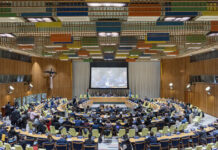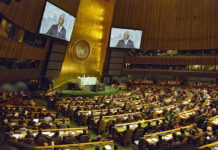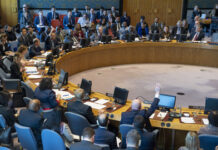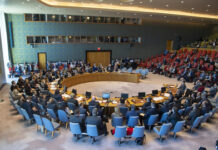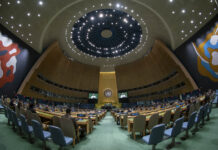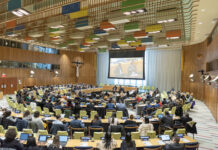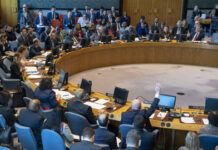This is the News in Brief from the United Nations.
Supporting refugees is all of humanity’s ‘obligation’: UN chief
While some of the world’s poorest countries and communities welcome refugees “with great hospitality”, the international community must match their generosity with far greater solidarity, UN chief António Guterres said on Friday.
Speaking at the closing of the Global Refugee Forum Mr. Guterres said that protection and help for these most vulnerable of people was “an obligation shared by all of humanity”.
He stressed that resources to support them are “under enormous strain”, especially in the Global South which bears a disproportionate burden in hosting refugees.
At the Forum, co-hosted in Geneva by the UN refugee agency (UNHCR) and Switzerland, the UN Secretary-General welcomed the pledges and commitments made by countries and the private sector.
These will help refugees rebuild their lives by improving access to education, healthcare, social protection, housing, employment and participation in public life.
In his video remarks Mr. Guterres also highlighted the need to tackle the root causes of displacement, in line with the 2018 Global Compact for Refugees including the devastating impacts of climate change, poverty and conflict.
Afghanistan: instead of justice, women survivors of violence face prison: UNAMA
Under Taliban rule in Afghanistan, women reporting gender-based violence to the authorities may end up in prison – allegedly for the victims’ own protection.
That’s just one of the shocking findings of a new report by the UN Assistance Mission in Afghanistan (UNAMA), which found that instead of filing a formal complaint many survivors prefer seeking redress through “traditional dispute resolution mechanisms” within the community for fear of the de facto authorities – including “fear of revictimization”.
The report says that the plight of victims is compounded by the handling of gender-based violence complaints predominantly by male police and justice personnel. Since their return to power in August 2021 the Taliban have almost completely erased women from public life and civil service positions in the country.
Mechanisms and policies enabling victims to obtain legal redress and protection have “all but disappeared” since the Taliban takeover, the report notes. Some 23 state-sponsored women’s shelters were dismantled as women survivors needed instead to be with their husbands or other male family members, Taliban officials were quoted as saying, and being sent to prison was the only alternative.
UNAMA noted that imprisoning women to ensure their protection from gender-based-violence “would amount to an arbitrary deprivation of liberty” with dire consequences for their mental and physical health. The UN Mission reiterated the de facto authorities’ obligation to ensure justice in gender-based violence cases, put an end to “the perpetual culture of impunity” and provide protection and access to services for victims.
Urgent help needed for millions of children affected by conflicts and disasters: UNICEF
Protection needs for children in emergencies from Ukraine to Gaza and Sudan have never been greater but the humanitarian funding forecast for 2024 is “increasingly bleak”.
That’s the message from the UN Children’s Fund UNICEF, whose Deputy Executive Director for Humanitarian Action and Supply Operations, Ted Chaiban, said that flexible funding for aid is shrinking.
At the same time, attacks against humanitarian actors around the world have surged.
“Children should not be paying the price of our inaction with their lives and their futures”, Mr. Chaiban said, stressing that youngsters need continued access to essential services including healthcare, safe water, basic sanitation and education.
Earlier this week UNICEF launched a $9.3 billion emergency funding appeal to reach close to 94 million children in 155 countries in 2024.
Mr. Chaiban said that this year’s ask was only about 50 per cent met and listed a number of “critically underfunded emergencies”.
These include Sudan, Burkina Faso, the Democratic Republic of the Congo – or DRC – Myanmar, Haiti, Ethiopia, Yemen, Somalia, South Sudan and Bangladesh.
A lack of resources means that “choices will need to be made” regarding a number of essential interventions including immunisation, primary healthcare, treatment against severe acute malnutrition, psychosocial support, addressing grave violations against children such as recruitment by armed groups, and education which is also “a life-saving intervention in emergencies”, according to UNICEF.
DR Congo mpox spread accelerating: WHO
A deadly mpox outbreak in the DRC has been rapidly spreading across the country, raising concerns of international transmission, the UN health agency WHO said on Friday.
Over 13,000 cases have been reported through mid-November with over 600 deaths including in three provinces not previously affected, WHO said.
The UN health agency reported that the strain of the virus responsible for the current DRC outbreak, called clade I, is more virulent than the predominant strain in the 2022 global outbreak – clade II.
The DRC outbreak outpaces the global mpox case fatality ratio fourfold – and up to nine times in endemic areas.
Human-to-human transmission in areas in which mpox is endemic is accelerating and 70 per cent of cases there are in children under 15.
Concerningly, the DRC outbreak has seen the first reported sexual transmission of clade I mpox and WHO warned that it is now “moving through sexual networks that include male and female sex workers and their clients in areas with high population mobility”.
The crisis is further compounded by the fact that the DRC is simultaneously facing a cholera outbreak and a protracted humanitarian emergency driven by armed violence and mass displacement.
WHO has been supporting the DRC Ministry of Health with the detection and confirmation of cases as well as ramping up treatment. The country does not yet have access to mpox vaccines and work is being done with the health authorities to develop an immunisation strategy and help move towards vaccine approval, WHO said.
Dominika Tomaszewska-Mortimer, UN News.
Source of original article: United Nations (news.un.org). Photo credit: UN. The content of this article does not necessarily reflect the views or opinion of Global Diaspora News (www.globaldiasporanews.com).
To submit your press release: (https://www.globaldiasporanews.com/pr).
To advertise on Global Diaspora News: (www.globaldiasporanews.com/ads).
Sign up to Global Diaspora News newsletter (https://www.globaldiasporanews.com/newsletter/) to start receiving updates and opportunities directly in your email inbox for free.



